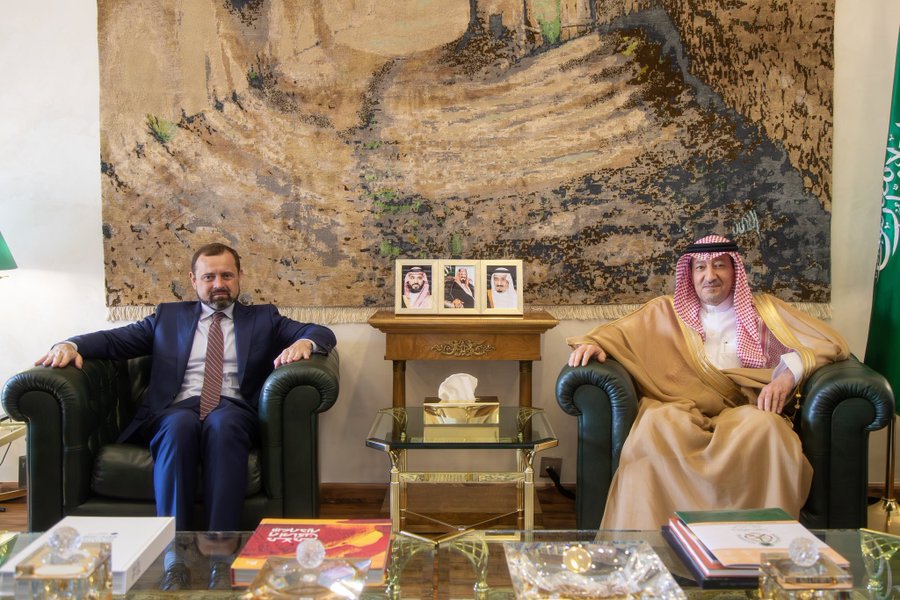US envoy to Sudan hopes SAF-RSF talks will resume after Ramadan

Saudi Vice Minister of Foreign Affairs Waleed Elkhereiji receives US Special Envoy for Sudan Tom Perriello, Riyadh, March 20 (Photo: @KSAMOFA on X)
US Special Envoy for Sudan Tom Perriello has expressed his hope that talks between the Sudanese Armed Forces (SAF) and the Rapid Support Forces (RSF) will resume following the Eid El Fitr that concludes the fasting month of Ramadan on April 8.
In an online Q&A briefing yesterday, organised by the US Department of State via its hub in London, US Special Envoy for Sudan Tom Perriello briefed his audience about the “urgent US efforts for peace and an immediate end to the war and humanitarian crisis in Sudan”.
The recently appointed special envoy who is now in Saudi Arabia, to be followed by a visit to the United Arab Emirates, has already talked with officials in Uganda, Ethiopia, Kenya, Djibouti, and Egypt, and with Sudanese activists and politicians.
It “is our job, all of us who care about the people of Sudan – around the world, around this neighbourhood and beyond – to be urgently seized with the project of ending this war, preventing the worst of this famine, and giving the Sudanese people a chance to determine their own future,” he stated in his opening remarks.
In the following Q&A session, Perriello said that “the only true solution here is to silence the guns, and that is going to require not only General Burhan and General Hemedti to reach that deal, but also for all of us across the region to be partners in peace.
“And particularly for those who have been fuelling the conflict rather than fuelling the peace efforts, we need that alignment now. And I think that’s the message first and foremost that we’ve been hearing from the Sudanese people and certainly something we’ve been hearing from our counterparts across the region.”
He referred to former “really important efforts across the region” to end the RSF-SAF fighting in Sudan. “And the role that Saudi Arabia has played in hosting the Jeddah talks, I think, can be an area that brings together pieces that have been emerging in Cairo and in Manama and other places. But we need to restart formal talks. We hope that will happen as soon as Ramadan is over, that those are inclusive talks of key regional actors as well as key voices from the inside, and that we can reach that agreement not just to end the violence but to really open up to full humanitarian access.”
Perriello said he sees the many initiatives to reach peace in Sudan “as an opportunity.
“I think the fact that there have been many different initiatives reflects the fact that there is growing concern across the region and a new sense of urgency. Frankly, we wish that urgency had been there before, but the clear message I’ve been getting, again, from Uganda to Ethiopia to Kenya to Djibouti to Egypt, is everybody understands that this crisis is barrelling towards a point of no return.”
He continued: “I’m speaking to Sudanese every day who’ve just escaped and describe hell on earth and talk about imminent death. We have a communications blackout in many areas that means people haven’t been able to speak to family members in ages or get good data on how many people are dying of malnourishment.”
Responding to a question about the impact of the various sanctions imposed by Washington on companies allied to the SAF or RSF on the fighting, Perriello said “We believe that they have. We think the sanctions have been significant, and both on individuals but also on some of the banks and other entities that have been supporting those individuals. [..] Do we think that it has ended the war? No, and that is why these peace efforts are important. But it is also important for those actors to know there are consequences of doing this horrific – these horrific atrocities.”
As for a question about including “outside backers” in future negotiations between the warring parties, he answered that the “peace talks should be inclusive” and including African and Arab key partners.
Concerning hardline Islamist factions of Sudanese society joining SAF’s ranks as and the involvement of Iran in backing the army, the envoy said: “For all of the chattering-class chatter about divisions, there could not be more consensus among the Sudanese people about what they want. “They want an end to this war. They want a silencing of the guns. They want full humanitarian access.”
He added: “In general, I think that there is a lot of concern about leaders from previous regimes coming back in. But I think there’s also an interest in putting together the elements that get us to a peace process. […]
“I think we see an opportunity right now where the leadership of RSF and SAF can come together and find that agreement. I think we have regional actors who can come together and help the Sudanese people demand the future that they want. And I think that those who are meddling around with – as extremist or other parties are not constructive to this process. I don’t think they’re serious about a peace process.”
The US envoy said he is hopeful to be able to relaunch formal talks soon. “We think those are likely to be coming out of the Jeddah process, but also drawing on lessons and progress that has been made in Manama and in Cairo and in Addis and in IGAD and other elements. And we think this is a crucial time for those elements to come together.”
Radio Dabanga reported yesterday that the USA, acknowledging Sudan as “the largest humanitarian crisis in the world”, has pledged more than $47 million toward the emergency response in Sudan and host communities in neighbouring countries, including Chad and South Sudan.











 and then
and then